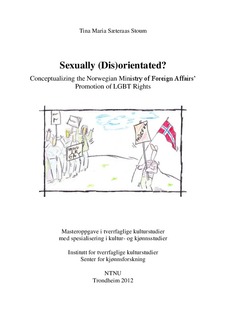| dc.contributor.advisor | Bolsø, Agnes | nb_NO |
| dc.contributor.author | Stoum, Tina Maria Sæteraas | nb_NO |
| dc.date.accessioned | 2014-12-19T13:09:24Z | |
| dc.date.available | 2014-12-19T13:09:24Z | |
| dc.date.created | 2012-11-12 | nb_NO |
| dc.date.issued | 2012 | nb_NO |
| dc.identifier | 567334 | nb_NO |
| dc.identifier.uri | http://hdl.handle.net/11250/244179 | |
| dc.description.abstract | In the mid-00s, Norway began announcing itself as an international advocator for lesbian, gay, bisexual and transgender (LGBT) rights. This thesis takes a close look at the Norwegian Ministry of Foreign Affairs’ policy of LGBT rights promotion in foreign countries. The analytical focus is on how the Ministry conceptualizes sexuality and nationhood in its official documents on the subject. The thesis seeks to identify how the problem of human rights violations of LGBT persons is presented, what assumptions the Ministry’s understanding is based upon, the production of subjects within its reach, as well as potential dilemmas that may come as consequences of the concurrent framework of understanding.
The Ministry’s policy can be understood as a continuation of the Gay and Lesbian, now LGBT, movement taking place in Norway over the last couple of decades. In the view of the Ministry, the movement may be successfully exported to places around the world who have not reached as “far” as the Norwegian society. Within this presentation lies a notion of the term sexual orientation as consisting of specific sexual categories/minorities that have a universal, and to some extent permanent, personality characteristic. The thesis also finds a tendency within the Ministry’s documents to present Norway as tolerant and modern in comparison to the recipients of Norway’s LGBT assistance, as these countries are in lack of something the Norwegian state can and will offer.
After examining the concurrent understanding of LGBT rights, its subjects, and the representation of Norway, the thesis take use of recent anthropological and ethnographical literary works in an attempt to relate them with the Ministry’s understanding and aims. How do they compare – and may hypothetically these cases of same-sex relations and desire be eligible for Norwegian LGBT support?
The measures within the Ministry’s reach are indeed well-intended, but as the policy is based upon particular terms and framework of understanding, the thesis finds a narrower reach than originally sought by the Ministry; advocating LGBT rights and advocating sexual freedom are not necessarily coinciding. | nb_NO |
| dc.language | eng | nb_NO |
| dc.publisher | Norges teknisk-naturvitenskapelige universitet, Det humanistiske fakultet, Institutt for tverrfaglige kulturstudier | nb_NO |
| dc.subject | Social and Behavioural Science, Law | en_GB |
| dc.title | Sexually (Dis)orientated?: Conceptualizing the Norwegian Ministry of Foreign Affairs’ Promotion of LGBT Rights | nb_NO |
| dc.type | Master thesis | nb_NO |
| dc.contributor.department | Norges teknisk-naturvitenskapelige universitet, Det humanistiske fakultet, Institutt for tverrfaglige kulturstudier | nb_NO |
